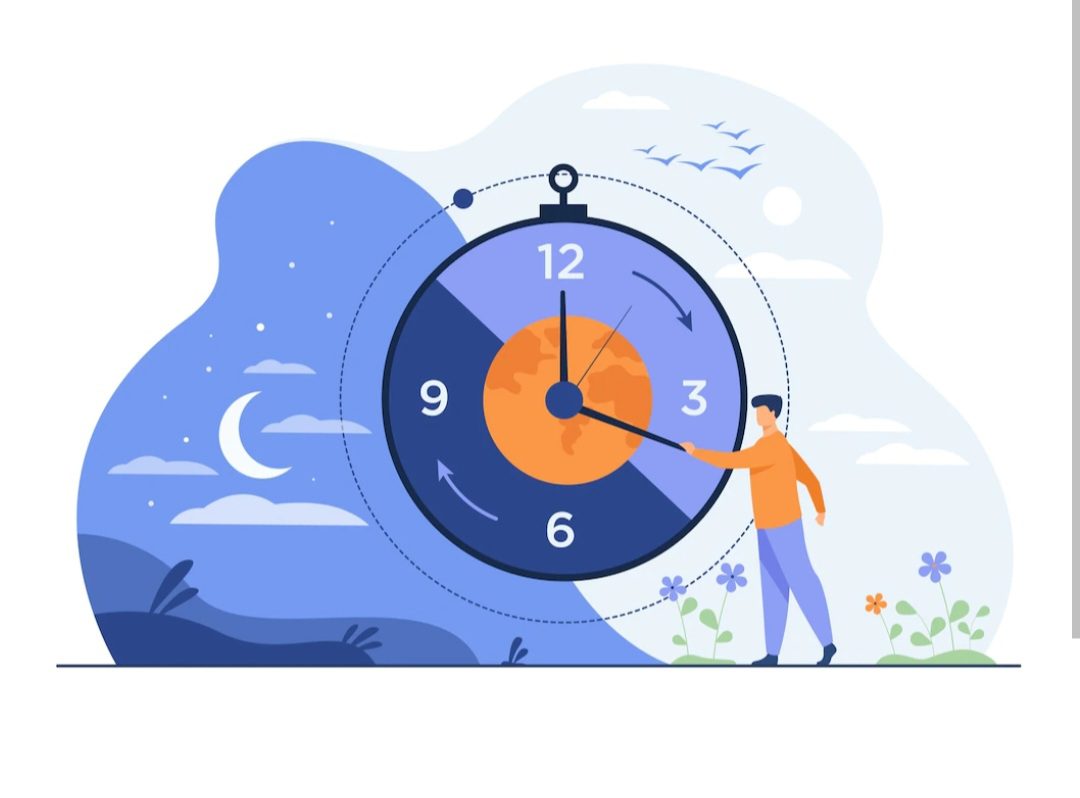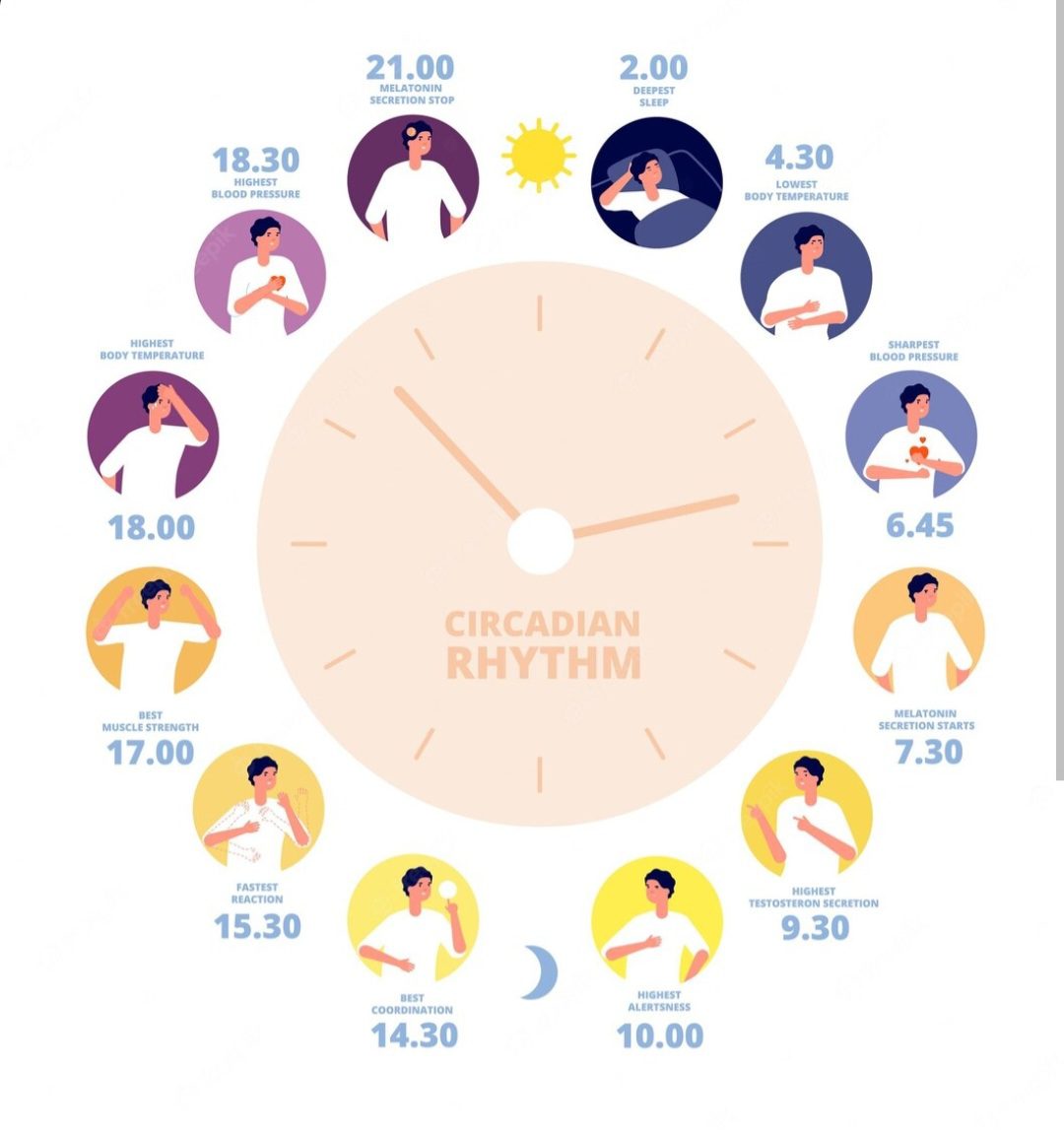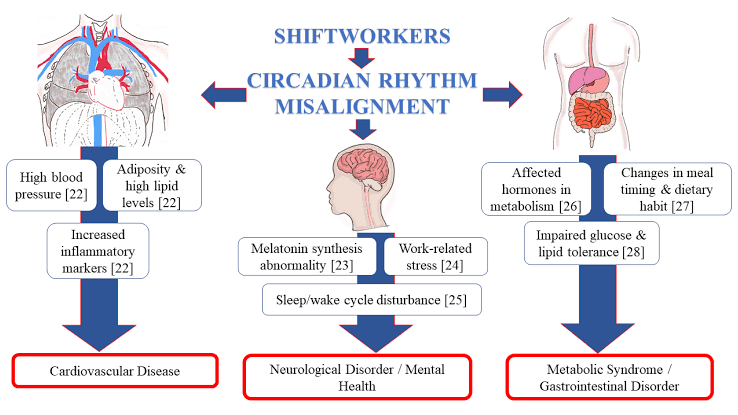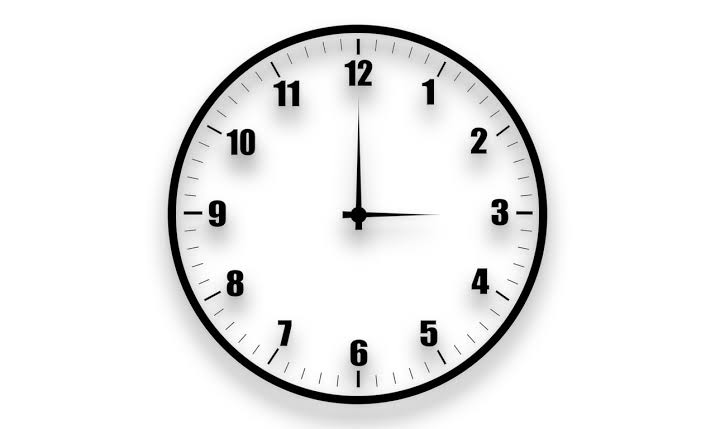Understanding The Circadian Rhythm Of Body…
Hello friends,
ForajCreation Welcomes you to the unique and trustworthy health blogging website that provides exceptional value to your overall well-being.
Today we will explore how the body responds to light and darkness and the internal mechanism that drives it to follow a specific cycle.
☆ Hey, Do you want to know why our body feels refreshed in the morning, stays alert throughout the day, becomes tired at night and then falls asleep?
= Don’t worry, here you will find an appropriate answer on the body’s cycle and how to maintain smooth functioning Here.
☆ Just Seat back! Relax & be Ready For Valuable Insights From This Post.
Let’s get started…

》Informative Introduction
The circadian rhythm or internal clock or biological clock is an internal body’s clock that regulates various psychological and behavioural processes in living organisms, including humans.
It operates on a 24-hour cycle and is mainly influenced by lighting and darkness.
This internal help to maintain inner body functions such as sleeping, eating, hormone generating, and other critical bodily functions.
This cycle is primarily manipulated by a small regional area in the brain known as the suprachiasmatic nucleus (SCN), which is located in the hypothalamus.
This tiny region receives information about outer weather and conditions through cells in the eye’s retina.
The SCN then sends a signal to the other parts of the brain and body to help the synchronization process of the 24-hour cycle.
When these cycle is functioning properly we feel refreshed in the morning, remain alert throughout the day and feel tired at night and fall asleep quickly.
Sometimes, disturbing the circadian
rhythm result in mood disorders, sleep disorders and other health problems.
We will discuss what is the factor that affects the circadian rhythm of the body.
Recent research also linked abnormalities in the circadian rhythm to several health conditions, including obesity, diabetes, cardiovascular disease and even some types of cancer. So that’s why maintaining a healthy circadian rhythm is essential for overall health and well-being.
Overall, Understanding the circadian rhythm of the body and taking steps to maintain it properly can have significant benefits for physical health and mental health.
Let’s Understand the circadian rhythm of body…
》Definition of Circadian Rhythm
“The “body clock” is the natural 24-hour cycle of physical, mental and behavioural changes that the body undergoes, known as circadian rhythm”.
This rhythm is primarily influenced by lighting and darkness and is controlled by a small area in the brain.
Circadian rhythm has an impact on various bodily functions, such as sleeping, hormone levels, body temperature, appetite and more.

》How does the body’s internal clockwork | Role of SCN in the Circadian Rhythm.
Several components work together to function properly in your body’s circadian rhythm or biological clock.
• Role of Cells
The internal clock is controlled by a group of nerve cells in the hypothalamus region of the brain called SCN – Suprachiasmatic nucleus.
The SCN receives information from light-sensitive cells in the retina of the eyes, which help to synchronize the Body’s internal clock with external cues like daylight and darkness.
This synchronization is important for regulating sleep-wake cycles, hormone production, body temperature and other bodily functions.
• Role of Hormones
The SCN also influences the release of hormones such as Melatonin, cortisol and growth hormones.
Melatonin is produced in the pineal gland in response to darkness and helps to regulate sleep.
Cortisol is produced in the adrenal gland which keeps the body alert and helps to maintain the body’s stress level.
Growth hormones are produced at night or during sleep which helps the tissue to repair, grow and heal the other parts of the body.
• Role of other factors
There are several external factors due to which rhythm may disturb.
– The metabolism rate of your body is important to consider in the circadian rhythm as it plays a crucial role in the biological clock.
– Temperatures of your body is drops and rise throughout the day, it is also an important part.
– Circadian rhythm also may adjust based on your work hours, physical activity, stress and anxiety level and additional habits or lifestyle changes.
– Age is another considerable factor in the circadian rhythm, babies, teens and adults differently respond to circadian rhythm.
》Circadian rhythm in different age
Circadian rhythm varies across different age groups and understanding it can help to optimize health and overall well-being.
• In Babies & Children
Circadian rhythm in babies and children is not fully developed at birth and undergoes several changes as they grow.
Newborn babies have irregular sleep-wake cycles and it takes a few weeks for them to establish more regular cycle patterns.
As they become age, the body’s internal clock becomes more established, and they develop a more stable circadian rhythm.
Children who maintain consistent sleep schedules tend to have better physical and mental health outcomes.
• In Adolescent
During adolescence, there are changes in the body’s internal clock that result in a natural tendency to stay up late and wake up later in the morning.
This change is attributed to changes in the production of melatonin, which regulates the sleep cycle.
Adolescent who follows their sleep-wake cycle tends to perform better academically, emotionally and behaviorally.
• In Adults
The internal clock is relatively stable and characterised by a regular sleep-wake cycle, with most individuals being more alert and productive during the day and feeling sleepy at night.
Individuals who followed better sleep schedules may have more focus, attention, concentration and presence of mind at their work leading to the growth in future.
However keep in mind, shift work, jet lag, and exposure to artificial light at night can disrupt this rhythm leading to poor sleep and health issues.
• In the older adult
As people age, The body’s internal clock gradually weakens leading to a decline in sleep quality and changes in the sleep-wake cycles.
Older adults go to bed earlier and wake up earlier than younger adults and they may experience more fragmented sleep.
These changes may be linked to several health issues and overall well-being.
Overall, Understanding the internal clock in differently aged people may help to optimize health.
Maintaining consistency in the sleep-wake cycle, minimizing artificial light exposure at night and staying away from phones, computers and T.V. bedtime may help to maintain a good circadian rhythm.
》Factors That Affect The Circadian Rhythm.
The internal clock is affected by many factors, both external and internal, that can disrupt its normal functionality.
Here are some of the main factors that can affect the circadian rhythm.
• Light and darkness
The most important factor that contributes to disrupting the biological clock is light and darkness.
The body’s internal clock is synchronized with the 24-hour day/night cycle and exposure to light or darkness can signal the jody to wake up or go to sleep.
• Melatonin
Melatonin is the hormone that produces in the pineal gland of the brain and it can help to regulate the sleep cycle.
The production of melatonin is controlled by the biological clock and the level of the hormones rise in the evening and fall in the morning.
• Temperature
The body’s temperature is also aligned with the circadian cycle of the body.
During the day body’s temperature is high and at the time of bed the body’s temperature is going to fall.
This lower temperature is one of the signals that tell the body it’s time to go to sleep.
• Eating and drinking
The eating and drinking consumption of certain food and beverages can also affect the circadian rhythm.
For instance, Caffeine and alcohol can disrupt sleep, while eating a large meal close to bedtime can make it hard to get sleep.
• Social cues
Social cues such as work schedules, school schedules and social activities can also affect the circadian rhythm.
For example, shift work and het lag can disrupt the internal clock.
• Age
The circadian rhythm changes as we age with infants and young children having a shorter sleep cycle and older adults having a hard time falling and staying asleep.
• Genetics
In last, genetics can also play a vital role in the circadian rhythm.
Certain genes have been identified that regulate the body’s internal clock and can affect sleep patterns and the timing of other bodily functions.
☆ Additional causing factors are:
– Medication.
– Stress.
– Mental health conditions.
– physical health conditions.
– Sedentary lifestyle.
– Habit of T.V., late-night eating, etc…

》Impact of disrupted circadian rhythm on health
Disruption of the circadian rhythm can have a significant impact on health.
Here we tried to understand how the changes in circadian rhythm can affect health and overall well-being.
01. Disruption of the circadian rhythm can lead to sleep disorders, such as insomnia, sleep apnea and restless leg syndrome.
02. Poor sleep quality due to a disrupted circadian rhythm can lead to fatigue, irritability and difficulty in concentration.
03. Disruption of the circadian rhythm is also linked with several health problems including, diabetes, obesity, cardiovascular disease, depression, bipolar disease and seasonal affective disorders.
04. It can also affect hormone production and regulation, which can lead to hormonal imbalance and other health issues.
05. It can also affect the immune system, increasing the chances of infection and other illnesses.
06. Jet lag is a common example of a disrupted circadian rhythm, it can cause fatigue, insomnia and other symptoms until the l body adjusts to the new time zone.
07. Disrupted biological clock can also lead to many other health problems such as memory issues, lack of energy, delay wound healing, digestion issues, and shift your body temperature.
So, It becomes important to maintain a healthy circadian rhythm to support overall well-being and health.
》 How to reset the circadian rhythm.
There are several ways through which we can reset our circadian rhythm.
01. Stick to sleep schedules.
It is the most important factor to reset your circadian rhythm that you have to go to bed and wake up at the same time every day and even on holidays.
02. Expose with natural light.
Exposure to natural light during the day can help to regulate your body’s internal clock.
Try to spend time outside during the day or sit by a window that lets in natural light.
03. Limit exposure to artificial light.
Avoid bright screens such as Android phones, tablets, computers, and laptops before bedtime as the blue light can pass negative messages to the brain that still it’s day instead of actual night and that’s why your circadian rhythm can disrupt.
04. Practice relaxation techniques.
Relaxation techniques such as meditation, deep breathing, and yoga can help to reduce stress and it can promote deep sleep.
05. Avoid caffeine and alcohol.
Consumption of Caffeine and alcohol can disrupt your sleep and affect your circadian rhythm so it is best to avoid them before bedtime or forever.
06. Exercise regularly.
Regular exercise can help to regulate your body’s internal clock and improve sleep quality.
07. Consider melatonin supplements.
Melatonin is a hormone that helps to regulate the sleep-wake cycles. Taking melatonin supplements may help to reset your circadian rhythm but it is always better to talk to a healthcare provider before taking such supplements.
08. Don’t nap late in the evening or afternoon.
09. Be patient
It is important to incorporate a fixed schedule and be patient during the resetting of your circadian rhythm.
It takes time to reset your biological clock.
So this is all about how you can reset your circadian rhythm and incorporate it with nature’s cycles.
》 Benefits of regular circadian rhythm | Why maintaining circadian rhythm is beneficial?
A regular biological clock can give your numerous health benefits and better overall well-being.
01. Better sleep quality.
A regular sleep-wake cycle can improve the quality of your sleep, helping you feel more rested and alert during the day.
02. Improve mood.
A disrupted circadian rhythm is linked with changes in mood and depression.
Following a regular biological clock can help stabilize mood and reduce the risk of these conditions.
03. Increase focus.
Regular biological clock can help you a lot to feel more alert and focused during the whole day which leads to improving productivity and performance.
04. Hormones regulation.
The biological clock plays a crucial role in regulating hormone balance, which is the production and release of hormones such as Melatonin, cortisol and growth hormones.
A regular biological clock can help to ensure optimal hormone balance.
05. Reduce the risk of chronic disease.
Disrupted circadian rhythms have been linked with an increased risk of Chronic conditions such as obesity, diabetes and cardiovascular disease.
By maintaining it we can reduce the risk of many chronic diseases.
06. Improve immune function.
The regular circadian rhythm can play an important role in regulating immune functioning, including the production and release of cytokines.
In short, a regular circadian rhythm can support a healthy immune system.
07. Better digestive system.
Regular circadian rhythm can help to maintain a better digestive system, by secretion of digestive enzymes and the movement of food throughout the digestive tract.
It can reduce the risk of acid Reflux and constipation.
This is why we have to maintain a regular circadian rhythm and benefit from a circadian rhythm in our daily routine life.
》WindUp Words…
Circadian rhythm is the biological clock that regulates various psychological and behavioural processes.
This cycle regulates various functions in the body such as sleep, body temperature, hormone levels and appetite.
Disruption of the circadian rhythm is linked with many health disorders like chronic disease, psychological disorders, mental health problems etc…
Disruption of circadian rhythm is can be caused by many internal and external factors such as stress, depression, diabetes, artificial light, poor sleep, work shift etc…
We can reset our biological clock by following regular and sticking to strict sleep schedules and work hours.
Subscribe to our blog post for further updates and the latest blog posts related to your Physical health, Mental health and Personal development.
We hope that you are deriving numerous benefits from our blog.
Be healthy!
Be happy!
Thank you…
Visit again…
••••••••••••••》ForajCreation《••••••••••••••••
